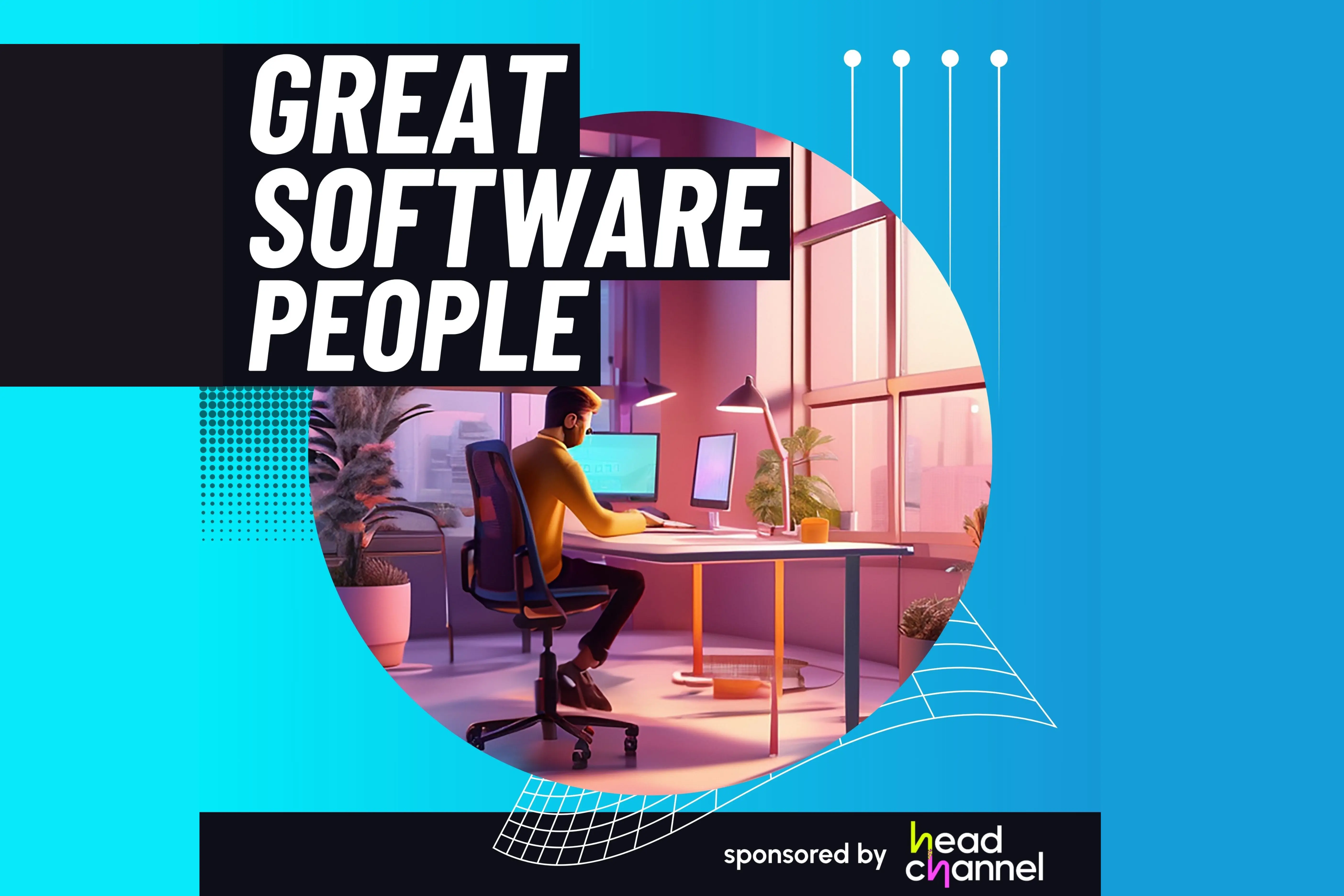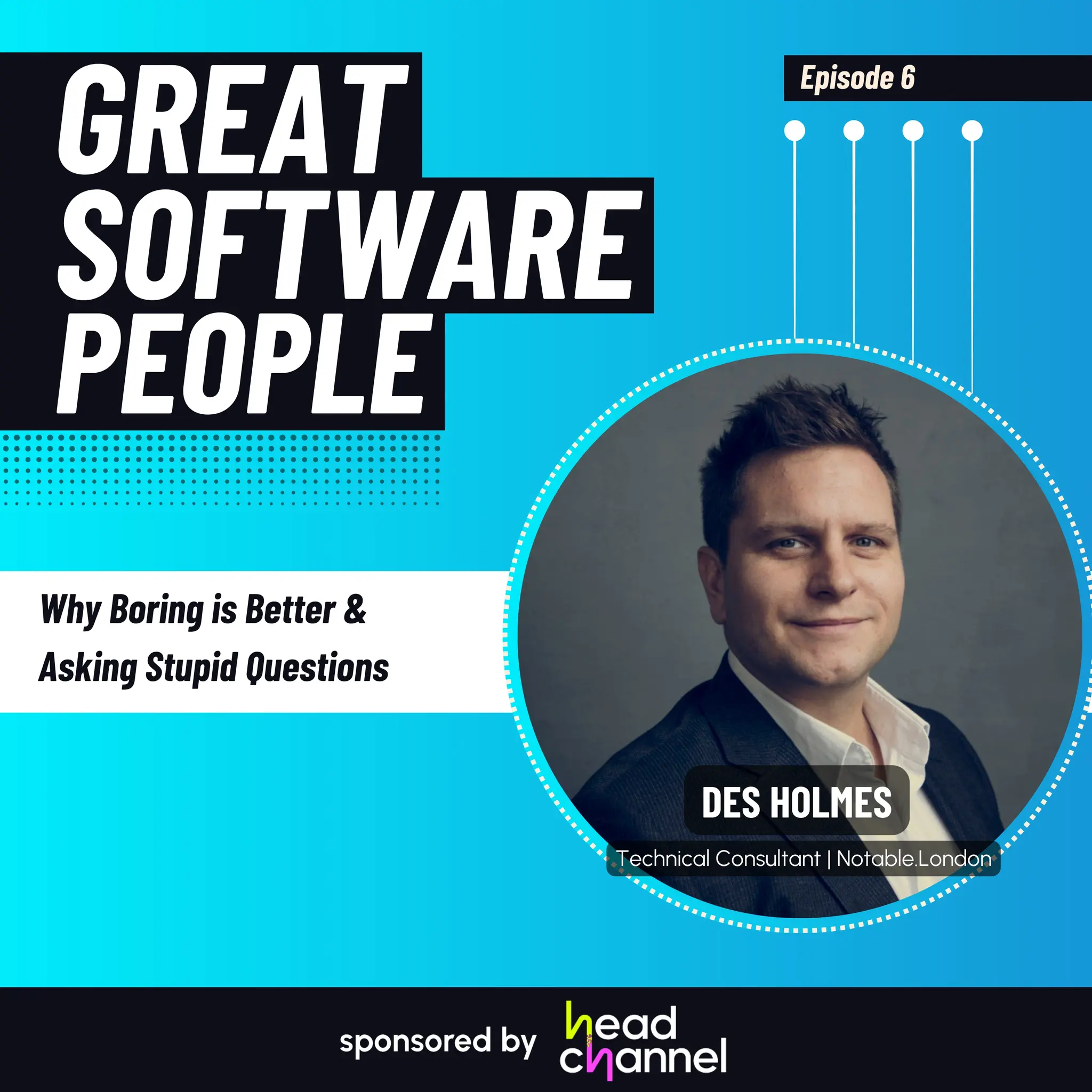
Why Boring is Better & Asking Stupid Questions with Technical Consultant, Des Holmes - E6
From an aspiring artist to a multitalented tech leader, Des Holmes’ path through software has seen him making his mark across the industry.
From an aspiring artist to a multitalented tech leader, Des Holmes’ path through software has seen him making his mark across the industry.
He’s worked both within teams and as a consultant, offering a perspective uniquely brimming with breadth, and he shares a selection of his most valuable learnings in this week’s episode of Great Software People.
This episode covers:
-
Diving straight into a developer job from completing his illustration & design degree
-
Acting as a technical translator between heavily techy people and marketing teams
-
AI’s place as a double edged sword, rather than a silver bullet
-
Finding success in consultancy after a role as Creative Technical Director
-
Why it’s important not to be afraid of asking stupid questions

Episode highlights
“I realised actually around 2007, I was better suited to technical direction because I was able to sit really well in between as a technical translator and turned into more of a diplomatic technical director at that point.” - 5:20 - Des Holmes
“At the minute, all of the AI stuff is a bit of a double edged sword. I keep saying the same thing to everybody, but I think people see it as like a silver bullet, or like they’re going to replace that department or that job, and it won’t exist anymore.” - 13:30 - Des Holmes
“I think one of my biggest learnings is not being afraid to ask for things, whether it’s for help or stupid questions. I used to instil that by asking really obvious questions myself.” - 27:45 - Des Holmes
“Software is always there to stay. With my daughter, she’s looking at the options for GCSE and I said, ‘Whether you like it or not, you’ve got to take computer science, because it’s going to be a key part of your job, even if you don’t go into it’. If you look at any other normal, traditional job now, you’re going to be touching an element of it.” - 39:10 - Des Holmes
LISTEN HERE:
[00:00:13]
Rich: Welcome to another episode of Great Software People. Today, I’m very excited to be joined by Des Holmes—someone I’ve known throughout my career. Des has worked in a wide range of places, especially in the agency world, and we’re going to dig into all of that today. Welcome, Des.
Des: Thanks for having me on. Good to chat with you.
Rich: So, Des, I always start with the same question. How did it all begin? Did you just wake up one day and think, “I really want to work in software”?
[00:00:54]
Des: You know what? Not at all. When I was younger, I always thought I was going to be an artist. I remember one of my dad’s friends angrily telling me on a golf course that I’d never make any money as an artist and that my paintings would only be worth something if I was dead. But then my dad got me a ZX Spectrum—the 48K one. That thing was revolutionary at the time. It was the transition from everything analog to digital. He also bought me a programming magazine. Neither of us knew what it was, but we typed in the code line by line. After about four days, we managed to get a sprite moving on the screen, and it was like magic. So, I had this split brain: a creative side that loved art and a logical side that was drawn to tech. I didn’t go down the traditional computer science route, though. I trained as an illustrator and went straight to art college.
Rich: So, how did you make the transition from illustration to tech?
[00:02:01]
Des: During my second year at art college, I realised it was going to be tough to make a living in illustration. Around the same time, computer graphics were starting to boom—Photoshop and other tools were on the rise. There was a small group of geeks using Macs to do interactive design, and I got curious. So, in my final year, I did a half-and-half course—interactive design alongside illustration. When I graduated, I moved to London with my half-and-half degree and started looking for work. I couch-surfed, pulled together a portfolio, and eventually landed a job as a jack-of-all-trades developer in 2001.
[00:03:00]
Rich: So, your degree was in illustration, and you went straight into a developer role?
Des: That’s right. As part of my interactive design course, I’d learned enough to get an entry-level job. I also strategically lived with a tech-savvy housemate who taught me a lot. I got a job at a small branding and communications agency doing a mix of interactive design and development.
Rich: What kind of projects were you working on?
[00:04:23]
Des: We were building interactive CD-ROMs—“rich media,” as we called it back then. One of the most memorable projects was for Save Our Seas. It was an immersive, interactive experience where you could explore the ocean floor, learn about sea creatures, and access educational content. At the time, this was cutting-edge stuff. I stayed there until around 2007, learning to program properly. By then, I realised I was better suited to technical direction. I had the ability to act as a translator between developers and non-technical stakeholders, like marketing teams.
[00:05:40]
Rich: Were there any standout campaigns during your agency years?
Des: Absolutely. I worked with some great agencies, including Glue. One of the most memorable projects there was an Adidas campaign called Impossible World. It was an immersive, interactive experience where users ran through a surreal world filled with crazy obstacles. Another fun project was a Christmas campaign where users could “ask Santa” for gifts. You’d type in what you wanted, and Santa would pull an image from Google. Of course, we had to filter out inappropriate search results—one early test for “jumper” pulled up a photo of someone jumping off a building. That was a lesson in the risks of automating things like that.
[00:08:44]
Rich: You mentioned that agency life is a young person’s game. Why do you think that is?
Des: It’s the pace and the culture. You’re working long hours, often under high pressure, and you have to be part of the social scene—beer, parties, all of it. It’s exciting when you’re younger, but it’s exhausting. By 2015, I’d decided to leave agency life and move into consulting.
[00:09:06]
Rich: What’s your take on Agile in the agency world?
Des: It doesn’t really work in that environment. Agencies often have fixed budgets and tight deadlines, so you’re not iterating—you’re just racing to get something out the door. Agile is great for long-term product development, but for campaigns, it’s better to adapt to the skills and preferences of your team.
[00:15:07]
Rich: So, you moved into consulting in 2015. What was that like?
Des: It was a game-changer. I started working with smaller firms, like Fathom, focusing on UX and financial applications. It was a different set of challenges—big data, real-time trading platforms, and regulated environments. The work was more structured than advertising, but the lessons I learned in agency life—like being scrappy and hacking things together—were still valuable.
[00:22:13]
Rich: One of your consulting gigs sounds particularly James Bond-like—working on autonomous underwater vehicles.
Des: Haha, yeah. That was with Hentsu. The challenge was building a data pipeline for autonomous underwater vehicles (AUVs) operating in the middle of the Atlantic. The servers were literally on a ship in the ocean, so we had to deal with poor satellite connections and limited data transfer windows. It was fascinating but also incredibly complex.
[00:27:22]
Rich: You’ve worked with remote teams as well. What have you learned about making those relationships work?
Des: Trust is key. Remote teams, especially offshore ones, can be hesitant to ask questions or challenge decisions. I made it a point to encourage questions—even by deliberately asking “stupid” ones myself to set the tone. Breaking down hierarchical barriers and building a culture of openness takes time, but it’s essential for high-performing teams.
[00:37:47]
Rich: What’s your take on the future of software development?
Des: It’s not going anywhere anytime soon. AI and no-code tools will definitely change the landscape, but they won’t replace developers. If anything, they’ll make software development more accessible. I always tell my daughter she should study computer science—even if she doesn’t want to be a developer—because tech is going to be part of every job in the future.
[00:39:34]
Rich: Des, this has been such an insightful conversation. Thank you so much for joining us on Great Software People.
Des: Thanks for having me! It’s been a pleasure.
[00:39:53]
Rich: Thanks for listening. If you enjoyed this episode, please subscribe and check out our other episodes. Until next time, take care.

Contact us.
If you need a partner in software development, we're here to help you.
We will respond to your enquiry immediately.